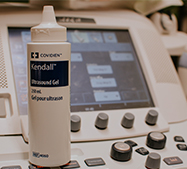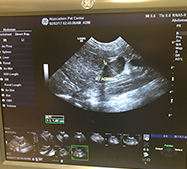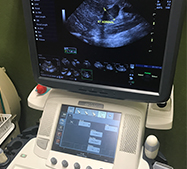We utilize state-of-the-art equipment in our in-house laboratory, where we can perform both common and emergency labwork. We are fully equipped for a wide range of imaging diagnostics with up-to-date technology in digital X-ray, MRI, CT scan and ultrasound.

In-House Laboratory
We utilize state-of-the-art laboratory equipment to identify underlying health issues in order to keep our animal companions healthy and happy. When our animal companions are in pain, they cannot tell us where they are hurting. In order to establish what is happening, we perform lab tests to help identify common concerns such as dehydration, anemia and infection, in addition to more extensive concerns such as kidney disease, liver disease and pancreatitis.
We highly recommend annual testing for the following:
- FeLV/FIV/Heartworm test (Feline Leukemia Virus & Feline Immunodeficiency Virus)
- Heartworm/ Ehrlichia / Lyme/Anaplasmosis test
We are able to perform common labwork and emergency labwork with our in-house equipment. The results are available to our veterinarians within approximately an hour. Common labwork performed at APHEC includes:
- K9 Parvo test
- Complete blood count (CBC)
- Pre-anesthetic screening
- Urinalysis
- PT (Prothrombin Time) — mainly used in poisoning cases
- Ethylene Glycol — used for antifreeze ingestion
Certain labwork can only be performed by an outside laboratory. We utilize Idexx Reference Laboratory for this purpose. Common labwork sent to Idexx Reference Laboratory:
- Biopsy
- K9 Young Adult Maintenance Screening
- Geriatric Screening
- Phenobarbitol Level
- Fecals
*Depending on sample sent, results are available to our veterinarians in approximately 24-72 hours

Digital X-Ray
In 2009 we upgraded our radiology system to include the Eklin Digital D.R. Digital (Computerized) X-ray imaging has revolutionized diagnostic radiology and is considered the most significant breakthrough in X-ray imaging in the last 25 years. This technology enables our veterinarians to magnify and enhance images for improved diagnostic confidence.
Benefits:
- Image can be magnified
- Contrast can be altered to enhance the image
- Images can be emailed to specialists for consultation
Ultrasound
One of our diagnostic tools is our ultrasound machine. An ultrasound is a safe, non-invasive way for our veterinarians to obtain an image of your pets’ internal organs. This enables the diagnosing of many health concerns including:
- Certain cancers
- Pregnancy
- Intestinal foreign bodies
- Foxtails in abscesses
- And more
Dr. Cherbinsky, along with several of our veterinarians, has advanced training in ultrasound procedures.

CT Scan
Atascadero Pet Hospital & Emergency Center is proud to be one of the few veterinary hospitals on the Central Coast to have an in-house computed tomography scanner, also known as a CT or CAT scan.
Our CT scanner is used to help diagnose internal medical conditions without using invasive surgery. A CT scan produces a series of images displaying the inside of the body with both horizontal and vertical cross-sectioned sliced images. This is done using technology similar to X-rays, however, instead of a single-dimensional image, the CT scanner allows us to produce 3D images to better evaluate an affected area or organ without having to physically cut into the patient. A CT scan may be used to locate internal injuries, internal bleeding, trauma, brain and spinal lesions, orthopedic injuries, and internal masses.
If your pet is scheduled for a CT scan, they will likely go through the following process. First, your pet is placed under full anesthesia as they need to be perfectly still for the scan, and our technician staff will monitor them closely. The pet is then laid comfortably onto the gantry (table part of the CT scanner) and slowly passes through a large round device that rotates at 360° around the patient to record images from every angle. The number of images depends on the pet’s particular situation.
After our veterinarian has reviewed the images, they are then sent out to a board-certified radiologist to interpret the images further. Once our veterinarian and the board-certified radiologist have reviewed the images produced from the CT scan, they will work with you to determine the best course of treatment for your pet’s health regarding their condition.
If you have any further questions regarding our CT scanner, please call our hospital at (805) 466-3880 or email us at mail@apetcenter.com



